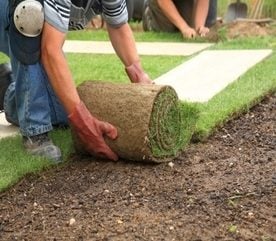Lawn Care Tips: What to Know About Fertilizer
An adequately fed lawn is denser, more weed free, and more attractive. A well-fertilized lawn withstands wear better and is more resistant to pests and diseases.

One great way to naturally fertilize your lawn is by using a mulching mower and leaving clippings in place. Applying too much fertilizer, on the other hand, can create problems.
Standard recommendations for feeding lawns with chemical fertilizers do not apply to organic lawn care. One of the best ways to ensure that your lawn gets the nutrients it needs is to top-dress it with screened compost. Or, you can use an organic fertilizer blend especially formulated for lawns.
Nitrogen promotes leaf formation and a deep colour. Some phosphorus and potassium should accompany it to maintain a proper balance and to avoid overstimulation that might encourage disease. The three major nutrients of a complete fertilizer-nitrogen (N), phosphorus (P), and potassium (K)-can be in such ratios as 3-1-1, 5-2-3, and so on.
There are many companies producing organic fertilizers and the exact formulation depends on the specific brand, but they will be somewhere close to these ratios. A lawn properly maintained, and cut with a mulching mower, will not need a lot of additional fertilizer. The clippings left by the mower will break down and supply much of the lawn’s requirements, depending on the type of grass.
Let the Lawn Tell You
Bare spots, poor, thin growth, new weed seedlings, moss, or the presence of diseased grass, all indicate a lawn in need of additional fertilizer. Kentucky blue grass, the commonest lawn grass in much of Canada, is especially prone to disease when it is lacking nutrients.
Organic lawn fertilizers are a combination of various organic substances such as blood meal, fish meal, bone meal, seaweed, alfalfa meal, granite dust, greensand, manure, or rock phosphate in differing proportions to achieve the desired formulation. They break down slowly and provide the nutrients over a period of time and also add organic material to the soil, helping to improve the texture.
Home-made compost can also be used as a lawn fertilizer. The nutrient value will not be known but the humus content will be high and will help improve the soil so the grass will grow better and stronger, crowding out weeds. It should be put through a screen first to remove any undecomposed material. It can either be broadcast onto the lawn with a shovel, or, for a more uniform coverage, be applied with a fertilizer spreader. The compost can also be used to make a compost tea, which can be sprayed onto the lawn using a hose-end or a backpack sprayer. Fish emulsion or liquid seaweed can also be used.



